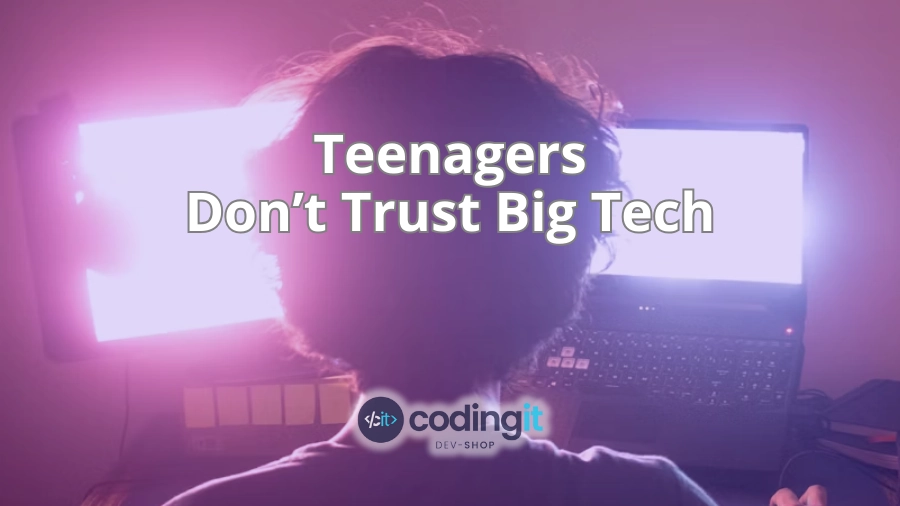For many years, Big Tech has enjoyed an almost unquestioned trust from its youngest users. Teenagers embraced platforms like Instagram, TikTok, and YouTube as digital playgrounds, shaping everything from how they socialize to how they learn. Social media has been, and continues to be, a core part of growing up. But something has shifted. The same generation that grew up online is now raising serious questions about the very platforms they once loved.
According to a recent survey, a staggering 64% of U.S. teenagers don’t trust Big Tech to protect their mental health. That’s a wake-up call. The kids who used to eagerly sign up for every new app are now second-guessing their relationship with technology. And they have good reasons to. From data privacy scandals to AI-driven content manipulation, the platforms they once saw as fun and innovative now feel exploitative and untrustworthy.
So, what happened? Why is trust eroding? What does this mean for the future of tech businesses? And what do companies need to do if they don’t want to lose an entire generation of users? Make no mistake, this isn’t just about bad PR. If teenagers no longer believe that tech companies have their best interests at heart, they won’t just complain about it, they’ll leave. And when that happens, the entire industry will feel the impact.

How We Got Here
Teens’ loss of trust in Big Tech isn’t some random trend or a passing phase. No, this trust erosion has been years in the making, shaped by scandals, missteps, and repeated betrayals from the very companies that once promised to make the world a better place. More connected, informed, and fun.
Remember when Facebook got caught harvesting user data without consent? Or when YouTube’s algorithm pushed harmful content to young audiences in the name of engagement? How about TikTok’s never-ending privacy controversies or Instagram’s own research confirming that their platform worsens teen mental health? Yet they still pushed for more engagement.
At first, users gave tech companies the benefit of the doubt. Maybe it was an oversight. Maybe they’d fix it. But then it happened again. And again. And again. Every single one of these moments contributed to why teens lose trust in Big Tech today.
The pattern became impossible to ignore: Big Tech companies say one thing and do another. They claim to prioritize user well-being, yet their entire business model revolves around keeping users hooked. They promise to protect privacy, yet time and time again, they’re caught exploiting data for profit. Teenagers have grown up watching these contradictions play out in real time and they’re done being fooled.
What the Data Tell Us
Big Tech has relied on one crucial advantage for years: teenagers wanted to be part of their platforms. They signed up eagerly, created content, and fueled engagement-driven algorithms with their every click. But now, something has shifted.
If you’re wondering just how deeply teens lose trust in Big Tech, the numbers paint a clear picture:
- 62% believe that profit is more important than user safety.
- 47% lack confidence in responsible AI implementation.
- 41% have felt misled by AI-generated images and content.
- 73% want AI-generated content to be labeled and watermarked.
The message is obvious: teenagers don’t feel protected, valued, or respected by the companies that dominate their digital lives.
Social Media’s Role in Mental Health
Tech companies have marketed their platforms as places for self-expression, community, and connection. And sure, social media has given teenagers a space to interact, learn, and share their lives. But behind the curated feeds and endless scrolling lies a darker reality.
From cyberbullying to body image issues, from dopamine-driven addiction to algorithmic rabbit holes, teens lose trust in Big Tech as they recognize that the platforms designed to keep them engaged are also making them anxious, insecure, and exhausted. And Big Tech knows it.
Studies continue to show a strong correlation between excessive social media use and rising rates of anxiety, depression, and sleep deprivation among teenagers. While Big Tech companies insist they are “taking steps” to address these concerns, their core business model still revolves around maximizing attention, not well-being.
The Growing AI Skepticism
AI is supposed to be the future, a revolutionary tool that will make life easier, smarter, and more efficient. At least, that’s how it is being sold. But for teenagers, the reality of AI isn’t as exciting as the marketing promised. Instead of innovation that empowers, they’re seeing technology that manipulates.
They’ve watched AI flood the internet with misinformation, from deepfake videos to AI-generated influencers that don’t actually exist. They’ve seen recommendation algorithms push extreme content, designed to keep them watching, not thinking. And they’re noticing how AI is quietly replacing creative work (writing scripts, generating art, and scraping personal data) all without clear boundaries or ethical oversight.
Don’t doubt that they understand the potential. They’ve used AI tools to edit videos, create music, and enhance creativity. But they also see how AI can be weaponized against them, from hyper-targeted advertising to fake images that distort reality.
The problem isn’t AI itself. It’s the lack of transparency around it. Teenagers aren’t asking Big Tech to stop innovating. They’re asking for honest answers, ethical guidelines, and protections against AI being used irresponsibly.

The Demand for AI Transparency
We all know artificial intelligence is here to stay, and teenagers are not naive about its potential. What they refuse to accept is a system where AI operates in the shadows, shaping their online experiences without clear rules, oversight, or consent.
Misinformation is everywhere. Deepfake videos spread faster than fact-checkers can keep up. Even newsfeeds prioritize engagement over accuracy, pushing algorithmically amplified content that’s often misleading. And when we can’t tell what’s real and what’s AI-generated, trust erodes.
Teenagers want AI-generated content to be visibly marked, so they know when they’re looking at something created by a machine. They want platforms to be upfront about how AI influences their feeds, instead of hiding behind vague “personalized recommendations.” And most importantly, they want a say in how AI interacts with them because right now, those decisions are being made for them, not with them.
Beyond “Move Fast and Break Things”
Big Tech loves to talk about innovation. About how their latest features, algorithms, and AI advancements are shaping the future. About how they’re building a better digital world. But a better world for who?
For too long, tech companies have followed the “move fast and break things” philosophy, an approach that prioritizes rapid development over long-term consequences. This means products that launch quickly, scale aggressively and fix their ethical concerns later (if ever). That era is over.
Teenagers are no longer passive users. They expect ethical design, transparency, and real accountability from the platforms they use. They want companies to think before they build, not after things go wrong.
The Business Impact of Teens Losing Trust in Big Tech
Thinking of teenagers as just users is a mistake. They’re the future workforce, the next generation of creators, and tomorrow’s decision-makers. The fact that they are losing faith in the platforms that once defined their digital lives is not a great sign for the institutions that have been established around them.
Teens losing trust in Big Tech is more than a reputational problem; it’s a business problem. When trust disappears, so does engagement. And when engagement drops, so does revenue. Big Tech depends on active, loyal users to fuel its ecosystems, from ad revenue to creator-driven content. If teenagers start walking away, the long-term impact will be impossible to ignore.
We’ve seen this before. Platforms that fail to evolve -that don’t listen to their users, that resist change until it’s too late- fade into irrelevance. Teenagers don’t wait around. They move on. They find alternatives. They build something better.
The companies that survive will be the ones that recognize this shift now, not after the damage is done. Because trust, once lost, isn’t easily regained.
Can Startups and Emerging Tech Earn Teen Trust?
Big Tech might be struggling to hold onto teenage trust, but that doesn’t mean all technology is being rejected. In fact, while teenagers are losing faith in established platforms, they’re actively exploring newer, smaller, and more transparent alternatives.
We’ve seen this shift before. When Facebook became cluttered with parents and privacy concerns, teenagers migrated to Snapchat, Instagram, and TikTok. Now, as those platforms face their own crises of trust, the cycle is repeating. Decentralized social networks, AI-free creative tools, and privacy-first messaging apps are gaining traction. Why? Because they offer something Big Tech has lost: authenticity.
Unlike major platforms that operate behind closed doors, startups, and independent tech projects are positioning themselves as pro-user, privacy-conscious, and ethically driven. They aren’t chasing engagement at any cost. They aren’t exploiting user data as a business model. Instead, they’re building with transparency, accountability, and control in mind. Exactly what teenagers have been demanding.
This shift is a warning sign for Big Tech: trust is no longer guaranteed. If legacy platforms don’t evolve, teenagers won’t hesitate to move on. And this time, they might not just switch to another big-name app, they might choose something entirely different.
Building Tech That Deserves Trust
For too long, tech companies have operated under the assumption that people will use their platforms no matter what. That users will accept vague privacy policies and put up with engagement-obsessed algorithms. But teenagers are proving that assumption wrong.
This generation of tech-conscious users is questioning digital platforms, analyzing them, and holding them accountable. That’s why the future of technology is about intention. The next wave of digital products and platforms will be judged not only by their features but by their values as well. How they handle privacy, transparency, and user well-being will determine whether they thrive or fade into irrelevance.
At CodingIT, we understand that technology implies more than what you build. It’s about how you build it. We have helped businesses create ethical, user-centric digital solutions that don’t just meet today’s standards but are built for the future of trust. And we can do that for you too. Take the lead and work with a team that understands the stakes. Let’s build something worth trusting. Reach out today.
